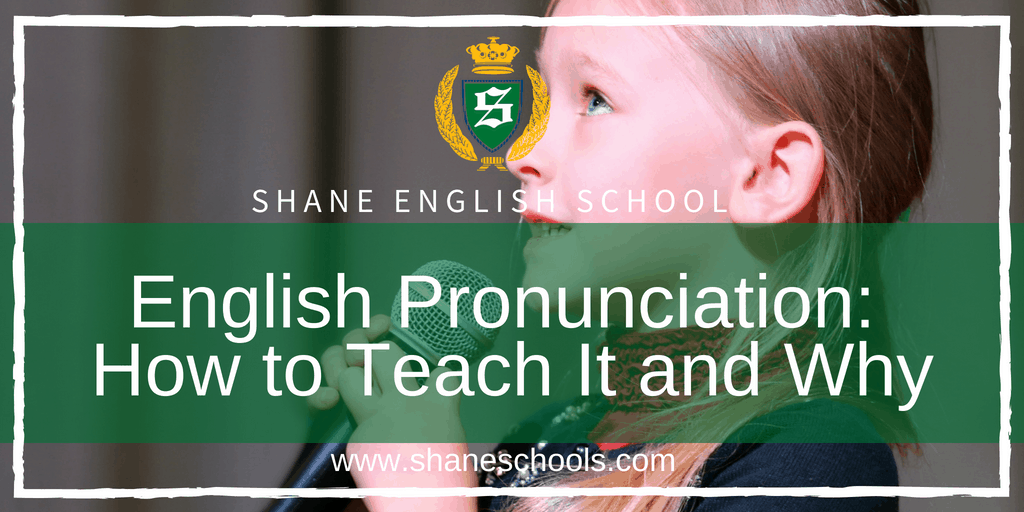In today’s world, English has become an international language that people from all parts of the world use to communicate with one another. To enable their students to use and produce this language effortlessly and smoothly, it is important that teachers include pronunciation in their lessons and pay attention to pronunciation.
In an average classroom, a teacher has limited time to deal with all aspects of language such as grammar, speaking and listening comprehension, writing and vocabulary. Pronunciation often gets neglected; there is simply not enough time for it. This will lead students to thinks that pronunciation is not important because, after all, it is something that will not be tested.
However, pronunciation is very important. If the students are to speak English fluently and understandably, communicate and understand both native and non-native speakers of this language, they are going to have to be able to produce language that is understandable because, otherwise, their communication will suffer or, ultimately, fail.
What is Good Pronunciation?
When one thinks of good pronunciation, the first thing that comes to mind will most likely be sounding like a native speaker. What is wrong with this belief? First of all, there are numerous varieties of the English language: different dialects, slang, jargon, which makes it difficult to pinpoint how ideal pronunciation would sound like. Secondly, no matter how hard they try, the majority of learners trying to master a certain type of pronunciation model they prefer will most likely never achieve that goal. This is especially true for learners who are not exposed to English in their everyday lives and for adult learners.
If trying to achieve that perfect model of pronunciation is a mistake, what would be a solution?
Teachers should advise their students to set goals for themselves that are more realistic. Having an accent that would give away what country or part of the world you come from is not a bad thing. What is important is that students learn to speak in a way that the majority of listeners will be able to understand, regardless of whether the listeners are native or non-native speakers of the language.
Setting Goals for Pronunciation
While it is important that the students don’t set goals for themselves too high, it is as equally important that they don’t set them too low either.
Teachers can understand basically anything and anyone; that is what we are trained to do. However, if students become too pleased with their pronunciation and believe it is good when, in fact, other listeners might not be able to understand what the speaker’s intentions were and what message they were trying to convey, that is not a good thing. Thus, it is of great importance that teachers don’t set the bar too low when it comes to their students’ pronunciation.
Accuracy vs Fluency
When teachers try to help their students with pronunciation, they usually focus on stress patterns, intonation and sounds. The goal of this type of training will, undoubtedly, be accuracy.
Accuracy means being able to properly produce sounds and, when they are focused or produce a certain sound or a word in isolation, most students will be able to do it accurately. But in a real-life context, there are many more factors that students think about, such as grammar and what they want to say.
However, that is only one aspect of good pronunciation. Fluency is as equally important as accuracy, and it is something most teachers that teach English as a second language have in mind as a goal for their students.
If your students are able to produce words, sentences and convey meaning in English and do it in a way that is smooth, without too many pauses to think what the appropriate term or tense would be, that is when we speak of fluency.
Seeing that both fluency and accuracy are important when speaking, as in pronunciation, it is advisable for teachers to pay attention to such activities that would practice both. For fluency that would be speaking exercises where not all sounds would be perfect but the speaker would convey meaning to the listener, and for accuracy – exercises with the emphasis on producing sounds, words and grammatical units accurately and correctly.
Things Teachers Need to Know Before Teaching Pronunciation to Their Students
- It is important that teachers have knowledge of stress patterns, intonation and the physical aspects of producing sounds – how the mouth moves, where the tongue goes, etc.
- The ability to predict what errors might occur, why they occur and how to correct them if there exists a need for correction.
- Teachers need to be knowledgeable of a variety of methods available for teaching pronunciation. Different groups of students may not have the same response to one method. It is, thus, important to be able to see what suits your students best. Recognize, adapt, overcome.
Basic Principles of Teaching Pronunciation
- Including listening comprehension exercises into your lessons is a great technique that teachers can use, besides just repetition drills.
- Highly technical explanations can be difficult for adult learners to understand and remember, let alone younger students. Simple demonstrations followed by a lot of practice and repetition will yield better results. Lessons need to fit the students’ level of understanding.
- Teaching your students how to become independent learners is one of the best things you can do. Once they leave school, they will face pronunciation difficulties on their own. By teaching them to listen to a model of speech, imitate it and keep an eye on their pronunciation, teachers will enable their students to be autonomous learners and help them in their future learning.
Teaching pronunciation is not easy and it takes time. Teachers shouldn’t expect their students to be able to master something right away after being introduced to it. Pronunciation teaching requires coming back to the same time thing over and over, giving lots of directions and continuous practice.
About the Author
Milica Madić, freelance blog/article writer from Serbia, with experience in teaching and working with young learners.

We're hiring!
With schools around the world, Shane English School always has exciting new opportunities to offer.


